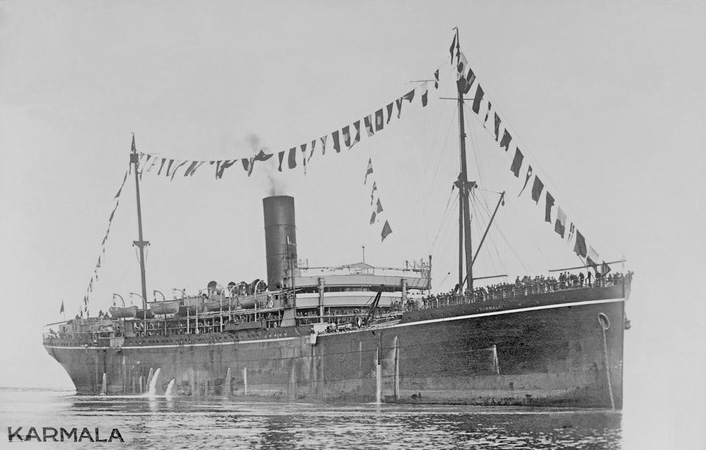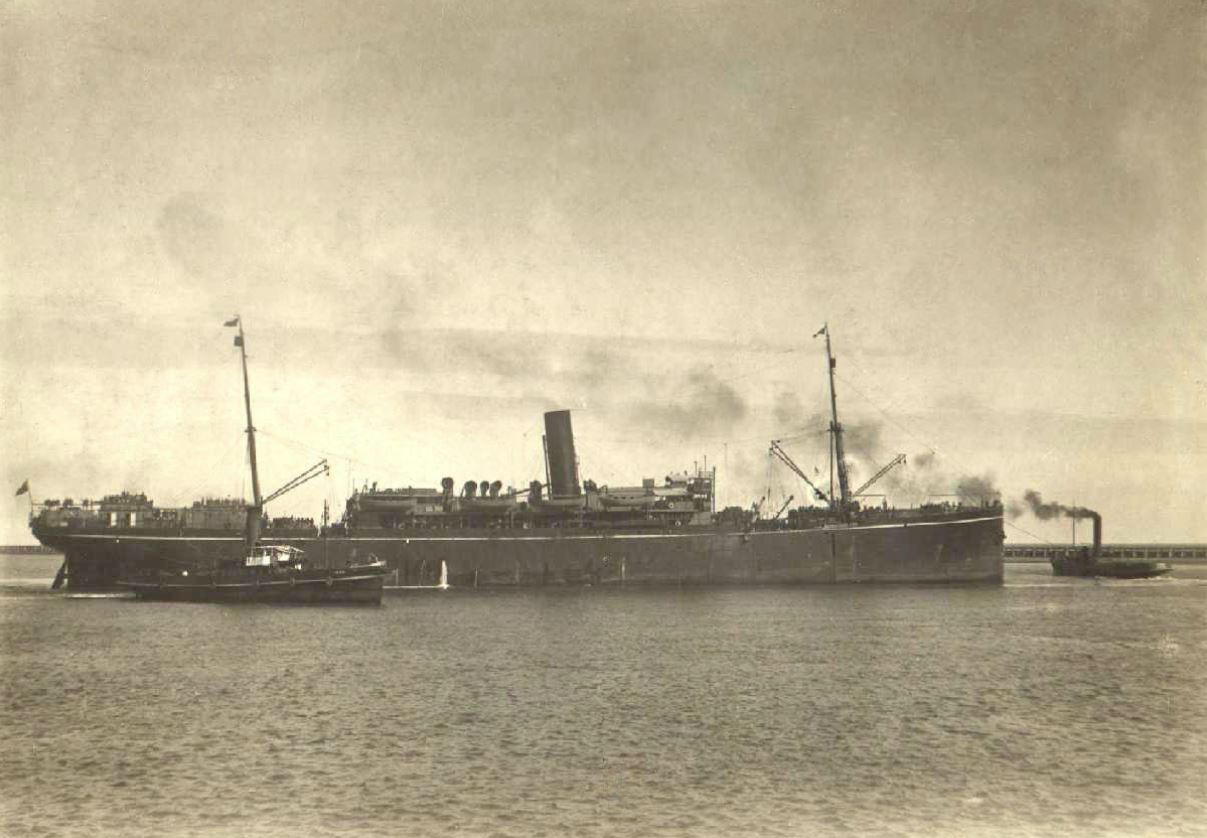Difference between revisions of "SS Karmala"
From Our Contribution
| (4 intermediate revisions by the same user not shown) | |||
| Line 7: | Line 7: | ||
| shipowner = Peninsular & Oriental Steam Navigation Co. | | shipowner = Peninsular & Oriental Steam Navigation Co. | ||
| shipbuilder = Cammell Laird & Co, Birkenhead | | shipbuilder = Cammell Laird & Co, Birkenhead | ||
| − | | shipyardnumber = | + | | shipyardnumber = 798 |
| − | | shiplaunched = | + | | shiplaunched = 14 Mar 1914 |
| shipcompleted = 1914 | | shipcompleted = 1914 | ||
| shipinservice = | | shipinservice = | ||
| − | | shipoutofservice = | + | | shipoutofservice = 1932 |
| shipinservice2 = | | shipinservice2 = | ||
| shipoutofservice2 = | | shipoutofservice2 = | ||
| shipreclassified = | | shipreclassified = | ||
| − | | shipID = | + | | shipID = |
| shipfate = | | shipfate = | ||
| − | | shiptype = | + | | shiptype = passenger/cargo liner |
| shiptonnage = 8,948 tons | | shiptonnage = 8,948 tons | ||
| − | | shiplength = | + | | shiplength = 146.25m |
| − | | shipbeam = | + | | shipbeam = 17.73m |
| − | | shipdepth = | + | | shipdepth = 10.3m |
| shippropulsion = steel twin screw | | shippropulsion = steel twin screw | ||
| − | | shipspeed = | + | | shipspeed = 15 knots (27.8 kmh) |
| − | | shipcapacity = | + | | shipcapacity = 147 passengers and crew of 192 |
}} | }} | ||
==Remarks== | ==Remarks== | ||
| − | Built for Peninsular & Orient Steam Navigation & Coy of London and used on the India/Far East service. Acted as the HQ ship for Indian Expeditionary Force during the Tanga operation. In 1915 she was returned to merchant service. Capable of carrying 147 passengers, she would have carried many more troops | + | Built for Peninsular & Orient Steam Navigation & Coy of London at a cost of £196,274 and used on the India/Far East service. Intended to be called ''Kandahar'' she was launched as ''Karmala''. Acted as the HQ ship for Indian Expeditionary Force during the Tanga operation to capture that town in German East Africa. |
| + | |||
| + | |||
| + | In 1915 she was returned to merchant service. Capable of carrying 147 passengers, she would have carried many more troops. Requisitioned as a North Atlantic transport, she sailed in ballast from England to North America, returning with foodstuff. However, during 1916 and 1917 she made at least two journeys from Australia to Egypt carrying amongst other things, Australian troops. In March 1917 she was attacked by a submarine in the Mediterranean. | ||
| + | |||
| + | <blockquote>Just after passing through the Straits of Messina we were attacked by a German submarine, two torpedoes missed us and then the submarine surfaced and attacked by gunfire. The ship replied with her only armament which was an old 4.7-inch gun with very little range. After a running fight the ship outstripped the submarine, doing well over her trial trip speed by screwing down the boiler safety valves and having extra men firing the boilers. Next day the ship struck the ground off the Italian coast due I understand to an uncharted rock though the Captain was hugging the coast in case of further submarine attack. The ship was quite badly damaged forward and flooded to sea level as far as the forward reserve coal bunker and we were 11 feet by the head when we made Spezia for repairs. <ref>https://www.poheritage.com/Upload/Mimsy/Media/factsheet/93485KARMALA-1914pdf.pdf</ref></blockquote> | ||
| + | |||
| + | |||
| + | ''SS Karmala''was attacked by submarine again in 1918 northwest of Ireland while carrying US troops. She was used to repatriate Australian troops from the UK in 1918/1919 before returning to the Indian and Far Eastern Service from England. On 16 Jan 1924 she suffered a fire in the engine room during which the storekeeper died. In April 1932 she was sold for £14,100 to a Japanese company for breaking up, and delivered to Japan on 30 Jun 1932. | ||
==Soldiers carried== | ==Soldiers carried== | ||
| Line 45: | Line 53: | ||
| + | <references> | ||
[[Category:Ships]] | [[Category:Ships]] | ||
Latest revision as of 14:37, 2 October 2023
Contents
Remarks
Built for Peninsular & Orient Steam Navigation & Coy of London at a cost of £196,274 and used on the India/Far East service. Intended to be called Kandahar she was launched as Karmala. Acted as the HQ ship for Indian Expeditionary Force during the Tanga operation to capture that town in German East Africa.
In 1915 she was returned to merchant service. Capable of carrying 147 passengers, she would have carried many more troops. Requisitioned as a North Atlantic transport, she sailed in ballast from England to North America, returning with foodstuff. However, during 1916 and 1917 she made at least two journeys from Australia to Egypt carrying amongst other things, Australian troops. In March 1917 she was attacked by a submarine in the Mediterranean.
Just after passing through the Straits of Messina we were attacked by a German submarine, two torpedoes missed us and then the submarine surfaced and attacked by gunfire. The ship replied with her only armament which was an old 4.7-inch gun with very little range. After a running fight the ship outstripped the submarine, doing well over her trial trip speed by screwing down the boiler safety valves and having extra men firing the boilers. Next day the ship struck the ground off the Italian coast due I understand to an uncharted rock though the Captain was hugging the coast in case of further submarine attack. The ship was quite badly damaged forward and flooded to sea level as far as the forward reserve coal bunker and we were 11 feet by the head when we made Spezia for repairs. [1]
SS Karmalawas attacked by submarine again in 1918 northwest of Ireland while carrying US troops. She was used to repatriate Australian troops from the UK in 1918/1919 before returning to the Indian and Far Eastern Service from England. On 16 Jan 1924 she suffered a fire in the engine room during which the storekeeper died. In April 1932 she was sold for £14,100 to a Japanese company for breaking up, and delivered to Japan on 30 Jun 1932.
Soldiers carried
Fremantle to Port Suez 12 February - 11 March 1917
England to Fremantle 2 January - 8 February 1919
England to Fremantle 1 July - 10 August 1919

